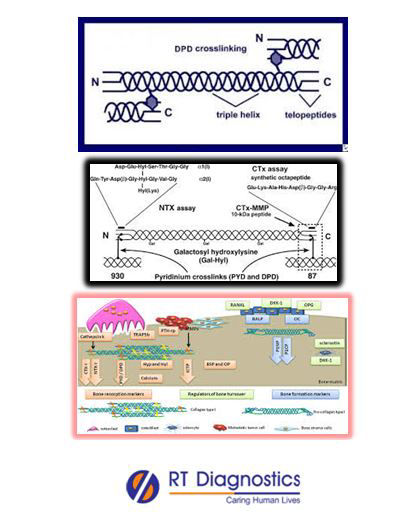DPD- Deoxypyridinoline:
Why DPD (Deoxypyridinoline) Test?
CLINICAL INFORMATION
Bones are formed (by osteoblasts), reabsorbed (by osteoclasts), thus recycled and reshaped constantly. Hormonal imbalance can affect the normal physiological equilibrium or the homeostasis of different organ systems including bone health. Hence healthy bones are important, especially to women with estrogen deficiency (due to hormonal imbalance) and in the period of menopausal period (age group). Collagen is a protein present in the bones which give stability (provides a soft framework) to the bone, along with calcium phosphate (hard framework). Collagen fibrils consist of many cross-linked amino acids that stabilize effectively the mature collagen molecules (eg Collagen types – I, II and III). Pyridinoline is the matured product of two hydroxylysyl (Hyl) residues. Pyridinoline (Pyr) is a cross-linked polymer formed from three hydroxylysine residues, while deoxypyridinoline (DPyr) is formed from one lysine and two hydroxylysine residues. Pyridinoline and deoxypyridinoline –are also known as hydroxylysyl and lysylpyridinoline. Pyridinoline (PYD) and deoxypyridinoline (DPD are also called as D-Pyrilinks / Pyrilinks-D / deoxyPYD– is one of the two Pyridinium cross-links that provide structural stiffness to type-1 collagen found in bones) are formed through the reaction of the side chain of residues of collagen during trimerization in bone maturation. Deoxypyridinoline levels are more pronounced in bone and its associated pathologies, such as post-menopausal osteoporosis, bone metastasis (bone tumour – Primary or Metastatic), Paget’s Disease etc. Since both PYD and DPD act as cross-links between collagen molecules (formed during collagen maturation), their proportion also likewise is found to be present (in both blood and urine) during its catabolic break down (mature degradation products of collagen) is finally eliminated (expelled) in urine. Thus, these levels serve as biomarkers (specifically DPD - as a tool to measure bone density) for bone health and also in its associated pathological disorders (eg. Bone diseases like osteoarthritis, osteoporosis etc). Qualitative Tests include HPLC, Immunoassay methods etc. Hence this Deoxypyridinoline (DPD) test remains as a useful tool in assessing for bone diseases (mainly as a specific marker of bone resorption and osteoclastic activity) and prognosis during treatment (especially in the osteoporosis treatment by evaluating the efficacy of the treatment – Effective Osteoporosis Treatment, Cortisone Therapy etc).DPD test is also a useful tool, hence it is performed in hyper-parathyroidism, hyperthyroidism, hypothyroidism etc. Other additional tests include BTMs - Biochemical Bone Metabolism Indicators – eg: Osteocalcin or Bone Protein G1a (BGP), N-terminal telopeptides & C-terminal telopeptides (NTx and CTx) are protein fragments of type-1 collagen, Ostase or BSAP - Bone specific Alkaline Phosphatase (BAP – Bone Alkaline Phosphatase is an isoform of Alkaline Phosphatase found on osteoblasts also called bone-forming cells, sensitive and reliable indicator) etc.

General Instructions:
Sample Requirement: Specimen –Urine Specimen is highly preferred (But, the blood sample may also be collected from the vein on demand by the Physician or pathologist – if required). Test Preparation: None.
NOTE - Sample for specimen collections may vary based on the patient’s condition/cases according to the patient’s presenting complaints/signs or symptoms:
SPECIMEN REQUIREMENT (Special or Rare Cases) - As instructed and guided by Physician / Clinician / Pathologist / as per Laboratory’s requirements, according to procedures and protocols.
This Multi-Specialty Clinical Referral Laboratory RTDIAGNOSTICS provides precise and accurate tests with an extensive range of testing services to the medical centres to help in the diagnosis and identification of pathology in the test specimens for infectious diseases and also to evaluate the function of organ systems of the patient. It prevents further complications and helps to stabilize and restore health to near normalcy at the earliest without delay.



